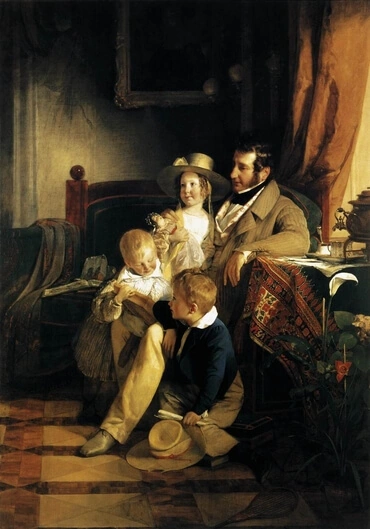666. And they stood upon their feet, signifies a new life, such as the regenerate man of the church has. This is evident from the signification of "standing," as meaning to be and to live, and also to sustain (See above, n. 414); also from the signification of "feet," as being the natural, which is the ultimate of Divine order, and the base upon which prior or higher things rest, and upon which they subsist (See above, n. 69, 600, 606); so "to stand upon the feet" signifies life in fullness, because in the ultimate. A new life is signified because the "witnesses" who are here treated of were killed and lived again. "To stand upon the feet" here means such life as the regenerate man of the church has, because this is said of "the two witnesses," by whom all who are in the goods of love through the truths of doctrine are meant, who are such as have been regenerated; also because when the natural, which is signified by the "feet," has been regenerated, the whole man has life such as the regenerated man has.
[2] This the Lord teaches in John:
Jesus said to Peter, He that hath bathed needeth not save to wash his feet, but is all clean (John 13:10).
"To wash" signifies to be purified from evils and falsities, which is to be regenerated, therefore "he that hath bathed" signifies he that has been purified, that is, regenerated in respect to the spiritual, which is the good of love and the truth of doctrine; these must first be received in the memory and understanding, that is, must be known and acknowledged. "Needeth not save to wash his feet" signifies that the natural or external man must then be purified or regenerated, which is done by a life according to the precepts of love and faith, that is, according to the goods and truths of doctrine from the Word. As this is done the man himself is purified or regenerated; for to live according to the goods and truths of doctrine from the Word is to will them and thence to do them, which is the same as to be affected by them and to love them; for what comes to be of the will comes to be of the affection and love, and therefore of the man himself; for the will is the very man, since a man is his own love and his own affection. This is why it is said that then "the whole man is clean. "
[3] From this it is clear why "to stand upon the feet" means such life as a regenerate man has. Therefore of "the dry bones" seen by the prophet on the face of the valley, when they had been covered with sinews, flesh, and skin, it is said:
When I had prophesied about the spirit, the spirit entered into them, and they revived and stood upon their feet (Ezekiel 37:10).
Here also "to stand upon the feet" signifies a new life, such as the regenerate man has; for "the dry bones" to which the house of Israel is likened signify the state of the church with them, namely, that it had no goods of love or truths of doctrine; and "being clothed with sinews, flesh, and skin" signifies regeneration; and "the spirit that entered in" signifies a new life through the influx and reception of Divine truth; therefore it is then said that "they revived and stood upon their feet."
[4] "To stand upon the feet" has the same signification elsewhere in the same prophet:
A voice speaking to me said, Son of man, stand upon thy feet that I may speak to thee; then the spirit entered into me when he spake unto me, and stood me upon my feet, and I heard him that spake to me (Ezekiel 2:1, 2).
And again:
I fell upon my face, but the spirit entered into me and raised me upon my feet (Ezekiel 3:23, 24).
This was done because "to stand upon the feet" signifies life itself when it is in its fullness; and life is in its fullness when the natural lives from the spiritual. For the ultimate of man's life is in his natural; this ultimate is like a base to man's interior and higher parts; for these close into the ultimate and subsist in it, consequently unless life is in the ultimate it is not full, and thus not perfect. Moreover, all things interior or higher exist together in the ultimate as in their simultaneous. For this reason such as the ultimate is such are the interior or higher parts, for these adapt themselves to the ultimate because it receives them.
[5] "To stand upon the feet" has a similar signification in David:
Thou hast made my feet to stand in a broad place (Psalms 31:8).
"A broad place" signifies the truth of doctrine from the Word, therefore "to make my feet to stand in a broad place" signifies to cause one to live according to Divine truths. Again, in the same:
He made me come up out of the pit of devastation, out of the miry clay, and set my feet upon a rock (Psalms 40:2).
"The pit of devastation" signifies the falsity of doctrine, and "the miry clay" the evil of life; and "to set the feet upon a rock" has a similar signification as above, "to make the feet to stand in a broad place," for "rock" signifies the truth of doctrine from the Word, and in the highest sense, the Lord in relation to Divine truth. Thence it is clear what is signified in the spiritual sense by:
Jehovah will not suffer my 1
foot to totter (Psalms 121:3);
namely, that he will not suffer the natural to go astray from truths; for so far as the natural goes astray, so far the interiors which belong to the understanding and will, also go astray.
Poznámky pod čarou:







